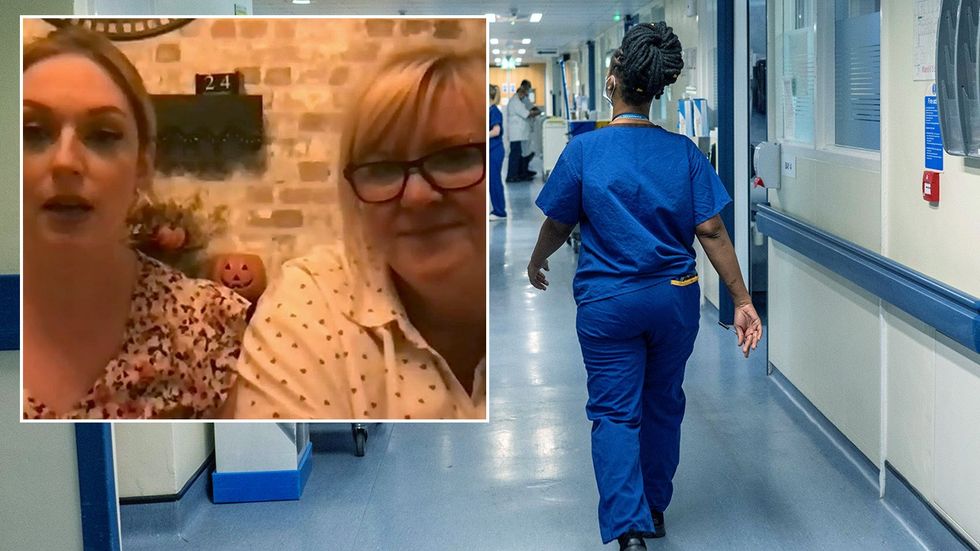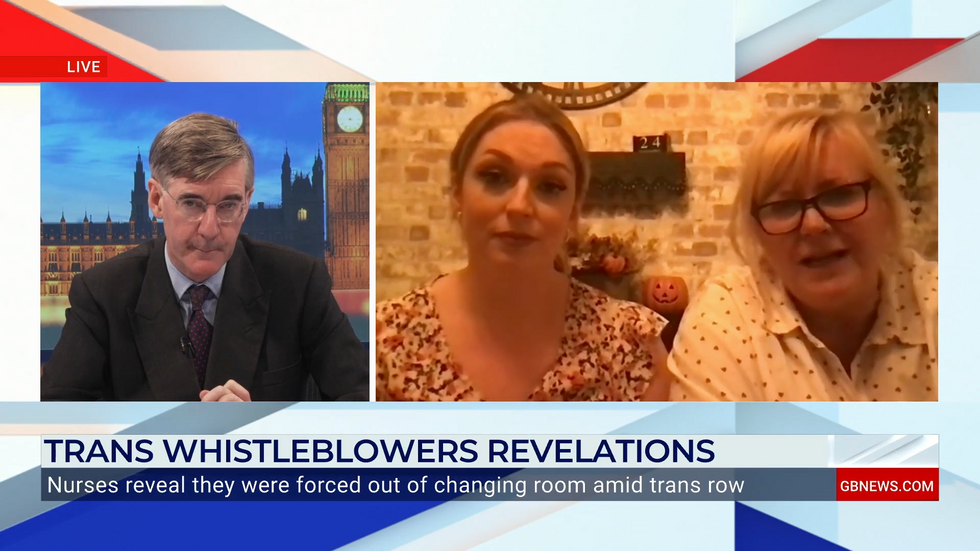Two NHS nurses have expressed their outrage and “humiliation” after their employer allowed a transgender colleague to share a changing room with them.
Bethany Hutchison, Lisa Lockey, Annice Grundy, Tracey Hooper and Joanne Bradbury – known as the Darlington Five – have launched legal action against the County Durham and Darlington NHS Foundation Trust after raising concerns about sharing a changing room with the transgender individual.
The female nurses claim the 26-year-old trans woman, named Rose, stared at their breasts and lingered in the room as they were getting changed.
Speaking to GB News about the incident, Bethany Hutchison and Lisa Lockey told host Jacob Rees-Mogg that they felt “silenced” by the NHS trust, and that many of their colleagues felt “too frightened” to speak up about it.

An NHS trust has come under fire after forcing female nurses to share a changing room with a transgender colleague
GB News / PA
Detailing the case, Lockey told GB News: “We were told by a colleague who had come across the individual that there was somebody using the changing room – the trust never told us anything.
“We were left to find out for ourselves, and it was a case of walking into the changing room, hearing a man’s voice and thinking, oh, I’ve come through the wrong door.”
Noting how they immediately felt “uncomfortable” about the situation, the nurses explained how they raised concerns with the trust, only to be told they should be “re-educated”.
Hutchison fumed: “We were appalled. We are educated and we are allowed to have this opinion of things as well.”

Five nurses from Darlington Memorial Hospital have launched a legal case against their employer
Google Street View
Lockey added: “There was a certain level of gaslighting where I actually did start to question myself and wonder if I was this really horrible, discriminatory person?
“I don’t have a problem with anybody, but I do have a problem with the trust trying to tell me that I should feel comfortable taking my clothes off in front of a man.”
LATEST DEVELOPMENTS:
When asked by Jacob how the situation was resolved by the trust, the nurses revealed that they were forced out of their changing rooms and made to get undressed in a converted manager’s office, on the main corridor of the hospital.
Lockey told GB News: “We used to have a massive changing room, but since we’ve put this complaint across, our manager’s office was cleared out and key pads were put on the door, but it is off the main corridor of the ward.
“So we noticed that if anybody was walking past and you were mid undress, they’d get a lovely eyeful. And it’s not an appropriate size for the number of nurses using it – there’s only six lockers.”
In criticism of the NHS trust, Hutchison claimed that transgender ideologies have “infiltrated the policies in the NHS” and they now feel “punished for complaining about changing in front of a biological male”.

Two of the nurses told GB News that they felt ‘silenced’ by the NHS trust
GB News
Hutchison said: “It’s just a great shame that they’re choosing a transgender person over the 95 per cent of female staff. It’s made us feel extremely ostracised.”
Lockey agreed, adding: “There is a real fear amongst a lot of our colleagues, they are really frightened to speak up about it, and they’re terrified of getting into trouble.
“We’ve been threatened for speaking to the media about it, we’ve been threatened that we were going to be subject to disciplinary action, so a lot of the girls feels it’s very much a silencing from the trust. They want to silence us.”
Responding to the nurses’ letter, a spokesperson for County Durham and Darlington NHS Foundation trust said that the letter “acknowledges individuals’ rights to raise concerns and sets out our commitment to providing a safe, secure, and respectful working environment for all colleagues and emphasises that there are robust internal systems and policies in place for raising serious allegations involving the personal circumstances of individual colleagues, in a way that is fair and maintains confidentiality for all those involved.
“We apologise if this letter has been interpreted differently and for any upset this may have caused.”